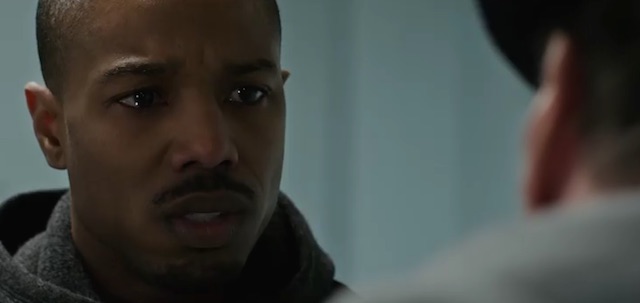
Rocky Balboa is back — as a supporting character in a boxing film. While that may sound strange to long-time Italian Stallion fans, they should rest easy: Ryan Coogler’s Creed is a welcome addition to the Rocky universe.

For movie fans who have been living under a rock, Michael B. Jordan stars as the illegitimate son of Apollo Creed, Adonis Johnson. The young man never met his father, who died in the ring during Rocky IV at the hands of Ivan Drago. Johnson’s mother also died when he was a boy, but Mary Anne Creed (played by Phylicia Rashad) took him in as her own.
It isn’t surprising to see what kind of themes are explored as Johnson attempts to define himself as a man while working his way out of his father’s shadow (e.g., abandonment, coping with death, letting go of the past, the importance of family). What is surprising is just how well Coogler pulls it all off — not for any lack of talent on his part, but because he is trying to succeed while tinkering with the “Rocky” brand.

Perhaps the easiest way to explain the movie’s worth to the franchise is to rank it in terms of the other films.
A convincing case can be made that Creed is the second-best movie featuring Balboa, if Oscar-contention is used as part of the litmus test. Coogler has given fans a drama. He has given them a tale of two men who slowly realize that if we become a prisoner to the past then we risk losing any number of potentially-beautiful futures.

Creed is not a movie for people who want to see larger than life characters like “Clubber Lang” or popcorn-movie gold like Rocky IV. It’s an tale that respects the source material, particularly 1976’s Rocky, but at the same time is very much its own film.
And for those who want to know how Johnson’s love interest, Bianca (played by Tessa Thompson), matches up with Adrian (Talia Shire), the answer is the same: Rest easy. Bianca is a welcome addition the the “Rocky” universe.
In short, everything in Creed feels natural. Nothing seems awkward or forced, which is good because the accomplishment has paved the way for a sequel if the creative team wants it.
The only way Coogler could have done a better job is if he invented a time machine and stopped Rocky V from ever happening, or Michael B. Jordan from signing on for Josh Trank’s Fantastic Four.
This looks like a great film! I really want to see this.
I had almost forgotten about the film, but I’m definitely seeing it now
I think as long as you go into the theater knowing that you’re getting much more of a “Rocky” movie than “Rocky IV,” then you’ll like it. If you do manage to see it in the theaters, then feel free to circle back and let me know what you thought. I’d like to know. 🙂
I olny liked the first 2, so I’m sure I will enjoy it. Honestly, I was reluctant to see it, as I saw the summary describing his tough street background.
I hate this stuff, I grew up in east San Diego, which during the 80’s was a pretty rough place (incidentally, Terrell Davis, Marcus Allen and Lincoln Kennedy all grew up in this same neighborhood)…and films like Boyz in the Hood, and Colors were worshipped in our neighborhood, but they were always about events ‘out of our control’ when in fact, most of the bad things happening were perfectly in our control. In other words, street movies always seemed to try to remove personal responsibility and try to blame some other nefarious reason for ghetto problems. Most of us asians that watched this, finished school and moved to Orange county…and still don’t know what the big deal is.
looking again, I guess this is a bit different.
“Films like Boyz in the Hood, and Colors were worshipped in our neighborhood, but they were always about events ‘out of our control’ when in fact, most of the bad things happening were perfectly in our control. In other words, street movies always seemed to try to remove personal responsibility and try to blame some other nefarious reason for ghetto problems. Most of us asians that watched this, finished school and moved to Orange county…and still don’t know what the big deal is.”
I’ve been having an ongoing discussion with a friend of mine who “escaped” some pretty rough neighborhoods in Washington, D.C. While the back-and-forth is always respectful, he seems to be much more inclined to attribute the community’s problems to racism than a long string of bad decisions by the people living there. I readily admit that racism exists, but I refuse to believe that it exists in America to the extent that it could keep a good, honest, and hard-working person from living a very good life.
Larry Elder wrote a book years ago called “Ten Things You Can’t Say in America.” In one chapter he mentions how a friend called him and said to meet him at a specific public library in a sketchy part of Los Angeles. The inside of the library was populated solely by poor Asians. His friend said it was a regular occurrence. If there is some weird white conspiracy to keep minorities down, then why do Asians score better than white people across the board — pick the industry — and aptitude tests? So why people set up a system that would put them at a disadvantage to Asians? It makes no sense.
My buddy Karl immigrated to the U.S. from Jamaica. He lived in Brooklyn when he first arrived. He’s doing just fine for himself, but he said it was a deficient culture that kept many poor people stuck in a life poverty — not racism.